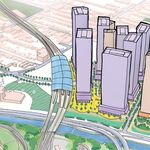TOareaFan
Superstar
Here's an idea that hasn't been raised...using tolls to offset other costs....ie Miller's plate tax. That's a way of making feel better about getting taxed.
At the end of the day Afransen is right....there has to be a direct cost to taking up road space if we want to end congestion.
This is where I (admitedly) get lost.....is the goal of road tolls to end/reduce/limit congestion? or is it to raise money?
If it is the latter they will be successful. If it is the former it will have no impact on congestion unless, and until, there are viable alternatives to using the tolled roads....that is why I suggested the wait until the higher priority parts of the Big Move were implemented.
There's various ways to implement it. For example, how about a rush hour or day time only congestion charge.
Again, this will limit the impact on tourists...sure but are the people driving into rush hour to get to their jobs going to not drive to work because there is a toll? Not likely....so, if it is a tax grab to raise money it will work....if it is seen as a congestion fighting measure....it will fail.




